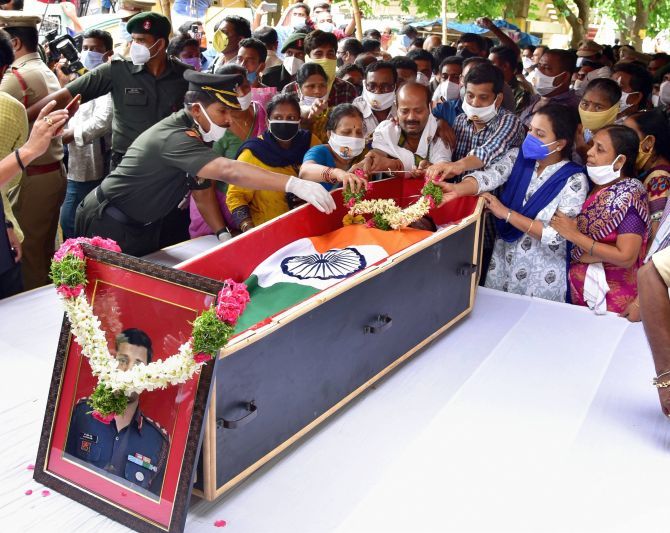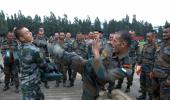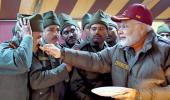'A firm national resolve can only deter and defeat the nefarious designs of the adversary,' notes Rup Narayan Das.

At a time when the country is passing through the twin threats from China -- first the coronavirus and now the premeditated attack at the Line of Actual Control and the horrendous killing of Indian soldiers in a most gruesome manner defying the Geneva Convention, political consensus cutting across party lines is very critical.
The onus is as much on the government as on the Opposition.
While the government must take the Opposition into confidence, it is incumbent on the Opposition parties to extend support to the government at this moment of grave national crisis.
A firm national resolve can only deter and defeat the nefarious designs of the adversary.
There is unprecedented nationalism reminiscent of the similar crisis when China attacked India in October-November 1962.
When parents of the martyrs take pride in their son-soldier's supreme sacrifice, what more evidence does one need of the rock solid resolve of the Indian people?
The mood of the nation resonated in Parliament when the Chinese attack took place in October 1962.
The Chinese attack ignited a debate on India's foreign policy, including non-alignment, India's defence policy, economy and planning process.
The attack exposed India's vulnerability in terms of defence preparedness and there was the demand for beefing up defence preparedness through indigenisation of defence production and procurement of advanced weapons from friendly countries.
Participating in a debate on November 8, 1962 on the proclamation of a national emergency on October 26, 1962 on account of the outbreak of the war, Professor N G Ranga recalling Acharya J B Kripalani's earlier statement that Panchasheel was born out of the rape of Tibet, said Mao Zedong 'was clever enough to get these things incorporated into the India-China treaty over Tibet.'
Questioning India's non-alignment, Professor Ranga pondered, '...How are we becoming strong if we hang on to this non-alignment policy... Non-alignment has not served us; does not serve any longer. The sooner we get rid of it, the better, the sooner we turn our back to it, the better...'
Making a plea to have a relook at our foreign policy, he argued that all democratic countries including the US, the United Kingdom, Canada, France had been noble enough to offer unconditional support to India.
After a long debate and discussion, Parliament passed the resolution which placed on record its high appreciation of the valiant struggle of men and officers of the armed forces while defending the country's frontiers and paid respectful homage to the martyrs who laid down their lives in defending the honour and integrity of the motherland.
The resolution affirmed 'the firm resolve of the Indian people to drive out the aggressor from the sacred soil of India, however long and hard the struggle may be.'
MPs also demanded that until the Chinese invaders were driven out from the Indian territory, there should be no negotiation for the settlement of the dispute.
It is against this backdrop that the government needs to take Parliament on board on the sensitive issue as how best to deal with China.
Defence Minister Rajnath Singh has said the government would make a statement in Parliament.
As it is uncertain when Parliament will meet, it is good that Prime Minister Modi has called an all party meeting to discuss the issue.
This initiative can be carried forward by convening a virtual meeting of the Parliamentary consultative committees, particularly on external affairs and defence and the respective standing committees of Parliament.
The benefit of the consultative committees is that the concerned ministers can directly brief MPs and interact with them to benefit from their perspectives.
Since the proceeding of such meetings is held in camera, there can be free and frank interactions.
Be that as it may, it needs to be recognised that India-China relations is currently delicate and critical and there should be absolute trust and confidentiality between the government and the Opposition.
In December 2018, the Parliamentary standing committee on external affairs under the chairmanship of Dr Shashi Tharoor endorsed the government's position on 'Sino-Indian Relations including Doklam, border situation and cooperation in International Organisations'.
In a very bold approach, the report recommended that 'It comes as a matter of concern to the Committee that even when India is overly cautious about China's sensitivity while dealing with Taiwan and Tibet, China does not exhibit the same deference while dealing with India's sovereignty concerns, be it in the case of Arunachal Pradesh or that of the China-Pakistan Economic Corridor (CPEC) in Pakistan Occupied Kashmir (PoK)'.
The government should engage Opposition leaders in its international campaign to expose China.
Rup Narayan Das, PhD, is a senior fellow at the Indian Council of Social Science Research at the Indian Institute of Public Administration, New Delhi.
Production: Aslam Hunani/Rediff.com










